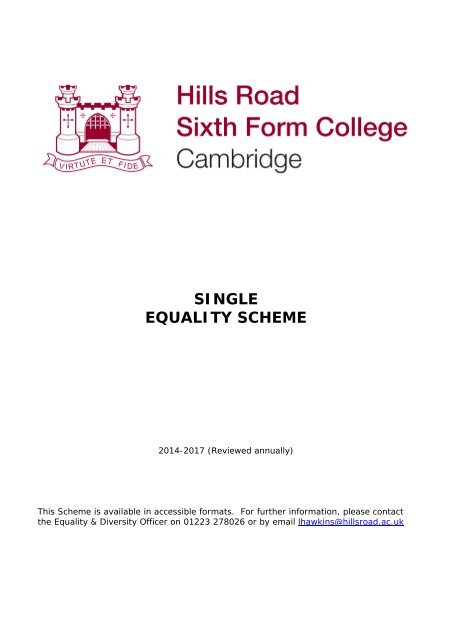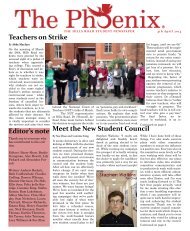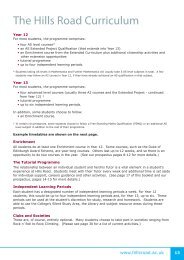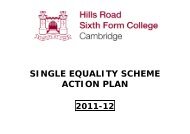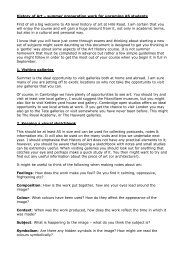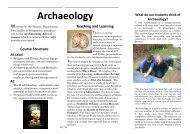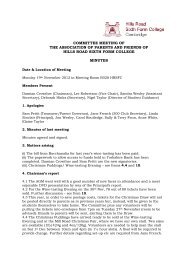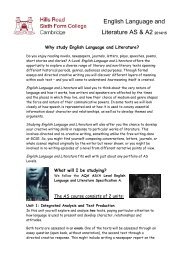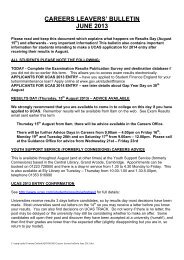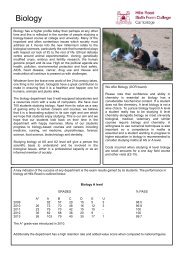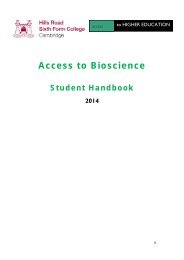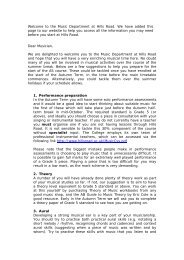SINGLE EQUALITY SCHEME - Hills Road Sixth Form College
SINGLE EQUALITY SCHEME - Hills Road Sixth Form College
SINGLE EQUALITY SCHEME - Hills Road Sixth Form College
- No tags were found...
You also want an ePaper? Increase the reach of your titles
YUMPU automatically turns print PDFs into web optimized ePapers that Google loves.
<strong>SINGLE</strong><strong>EQUALITY</strong> <strong>SCHEME</strong>2014-2017 (Reviewed annually)This Scheme is available in accessible formats. For further information, please contactthe Equality & Diversity Officer on 01223 278026 or by email lhawkins@hillsroad.ac.uk
CONTENTSPage1.0 Introduction 32.0 Our commitment 33.0 Where are we now? 44.0 Where do we plan to be? 45.0 How are we going to get there? 76.0 Responsibilities under the SES 77.0 Communicating our commitment 88.0 Monitoring and reporting 89.0 Equality Analyses 910.0 Further guidance 911.0 Linked policies and procedures 1012.0 Useful contacts 10Appendix Legislative context and duties 112
3.0 Where are we now?In drawing up this scheme, we have been focused on our commitment as a <strong>College</strong> tocelebrating and valuing diversity and to the promotion of social justice for all. Throughour work on equality, we recognise that we currently face the following challenges.Current aims for staff to maintain an appropriate gender balance to maintain an appropriate balance in terms of employee age range to encourage applications from disabled people and encourage existing staff with adisability to disclose this to encourage applications from ethnic minority job applicants to achieve anappropriate balance that reflects the local community.Current aims for students to encourage students 1 with a disability 2 to disclose this to be equally attractive to all qualified students regardless of their specific needs orschool of origin to maintain an appropriate gender balance to seek ways of addressing the relatively less strong retention outcomes for thosestudents in the lowest GCSE grade boundaries and also for students identifying asbeing of black ethnicity to establish a strong indicator of socio-economic background to facilitate monitoringof achievement and progression 3Challenges in relation to both students and staffIncomplete or missing data for full time 16-19 and Adult Education students withregard to some protected characteristics (including socio-economic indicators) whichimpacts on the level of monitoring that can be achieved.4.0 Where do we plan to be?The <strong>College</strong> has agreed the following five key objectives which have been identifiedfrom the more detailed list in this Single Equality Scheme:1. to provide comprehensive support to, and make specialist information, adviceand guidance available to, all applicant students and new students to enablethem to access <strong>College</strong> courses, services and facilities wherever possible2. to maximise the opportunities for all students to achieve their potential inparticular through removal of any possible barriers to accessing learning3. to ensure accessibility for all students to the full range of Student Services,including Study Skills4. to equip students with the skills and knowledge needed for life in a global societyby embedding a global awareness within the curriculum including providingopportunities for students to learn foreign languages and inter-cultural skills5. to ensure that all staff teaching students with disabilities have access to relevantinformation and are supported in their work1 Including AE students2 Disability includes physical, mental ill health and learning difficulties3 Currently indicated by free school meals (FSM) data from previous school and Bursary Award data
APlanning, Monitoring and EvaluationObjective 1Objective 2to ensure that the <strong>College</strong>’s commitment to all students and staffis embedded in its strategies, policies and procedures scrutinisedthrough a rolling programme of Equality Analysesto carry out systematic evaluation of progress towards providingfor the needs of all students and staff as an integral part of the<strong>College</strong>’s planning and review cycleBPre-enrolment, Enrolment and InductionObjective 1Objective 2to ensure that the <strong>College</strong>’s procedures for pre-enrolment,enrolment and induction are fully accessible to all studentsto record equality information disclosed about a student’s needs atthe earliest opportunity on the <strong>College</strong>’s Information Systems andto consider the implications of this information for the student’sexperience at the <strong>College</strong>Objective 3 to provide comprehensive support to, and make specialistinformation, advice and guidance available to, all applicantstudents and new students to enable them to access <strong>College</strong>courses, services and facilities wherever possibleCTeaching and LearningObjective 1Objective 2Objective 3to maximise the opportunities for all students to achieve theirpotential in particular through removal of any possible barriers toaccessing learningto design all teaching and learning materials to be accessible to allstudents wherever possibleto provide accessible examination and assessment arrangementsfor all students wherever possibleDCurriculum DevelopmentObjective 1Objective 2to build mutual respect and understanding between differentgroups, faiths and cultures.to equip students with the skills and knowledge needed for life in aglobal society by embedding a global awareness within thecurriculum including providing opportunities for students to learnforeign languages and inter-cultural skillsEStudent Support and GuidanceObjective 1to ensure accessibility for all students to the full range of StudentServices, including Study Skills Support5
10.0 Further guidanceFurther help and guidance in relation to the Single Equality Scheme is available asdetailed below:Name Title Tel No. E-mail address For matters relatingto:Ms Jo Trump Deputy Principal 01223278026jtrump@hillsroad.ac.uk Overall responsibilityfor Equality &Mrs LouiseHawkinsMs AnnaHeathfield/Mrs MicheleNightingaleMr RorySeddonMrs ClaireWalkerMs NatalieMossMs Linda PikeMr NigelStandbridgeMrs SaraHalliwellMr GlenTaylorEquality &DiversityOfficer/PA to theDeputy Principal01223278026Human Resources 01223278063Director ofBusiness andFinance01223278037Admissions Officer 01223278038Sports and TennisCentre Manager01223278039Student Guidance 01223Officer278046Estates Bursar 01223278056Head of StudySkillsDirector ofStudent Support0122327805701223278057lhawkins@hillsroad.ac.ukhr@hillsroad.ac.ukrseddon@hillsroad.ac.ukcwalker@hillsroad.ac.uknmoss@hillsroad.ac.uklpike@hillsroad.ac.uknstandbridge@hillsroad.ac.ukshalliwell@hillsroad.ac.ukgtaylor@hillsroad.ac.ukDiversityGeneral enquiriesrelating to Equality &DiversityEnquiries relating tostaff recruitment andpersonnel issuesEnquiries relating toAdult EducationstudentsEnquiries relating toadmissions of sixthform studentsEnquiries relating tomembership of thesports and tenniscentreEnquiries relating tosixth form studentsEnquiries relating tobuildings,accommodation andfacilitiesEnquiries aboutlearningdisabilities/studentsupportEnquiries regardingChild Protection andstudents9
11.0 Linked Policies and Procedures Admissions Complaints Confidentiality Data Protection Disclosure Equality Analysis Grievance Harassment and Bullying Health and Safety Pay Recruitment Risk Management Staff Code of Conduct Student Misconduct12.0 Useful contactsThe Equality and Human Rights Commission (incorporating the formerCommission for Racial Equality, Equal Opportunities Commission andDisability Rights Commission) www.equalityhumanrights.comThe Interfaith Network: www.interfaith.org.uk – promoting good inter faithrelationsStonewall: www.stonewall.org.uk - works to achieve legal equality and socialjustice for lesbians, gay men and bisexual peopleDisabledGo: www.disabledgo.com - provides detailed information on accessto all kinds of places; this information has been collected in person by ateam of DisabledGo surveyors.10
APPENDIX TO THE HILLS ROAD SIXTH FORM COLLEGE <strong>SINGLE</strong> <strong>EQUALITY</strong><strong>SCHEME</strong>Appendix 11.0 The Equality Act 20101.1 The Equality Act makes reference to “protected characteristics” which covers allthe existing grounds on which discrimination is prohibited (age, disability,gender reassignment, marriage/civil partnership, pregnancy/maternity, race,religion/belief, sex and sexual orientation). Under this Act the following typesof behaviour are prohibited by law: Direct discrimination. It is unlawful to treat an individual less favourablybecause of a protected characteristic (eg on the grounds of gender or race) Indirect discrimination. It is unlawful to apply a criterion or practice which isdiscriminatory in relation to one of the protected characteristics (eg setting awritten test (in English) during an interview where one of the candidatesdoes not have English as a first language Harassment. It is unlawful to engage in unwanted behaviour relating to oneof the protected characteristics which has the effect of violating dignity orcreating distress (eg sending emails containing racist comments) Victimisation. It is unlawful to subject someone to a detriment because theyhave brought proceedings under the Equality Act or given evidence orinformation in connection with the Equality Act. Associated discrimination. It is unlawful to discriminate against someonebecause they associate with another person who possesses a protectedcharacteristic (e.g. a family member or friend)1.4 In specific circumstances, the Act allows positive action as a way of overcominginequality. For example, positive action allows organisations to: provide facilities or services (in training, education or welfare) to meet thespecial needs of people from particular racial groups (for example, Englishlanguage classes) target job training at particular groups that are under-represented in aparticular area of work encourage applications from groups that are under-represented in the<strong>College</strong> favour a candidate from an under-represented or disadvantaged group(where candidates being considered for a role are otherwise equallyqualified).Positive action strategies are intended to be temporary measures only. Theymust be kept under regular review and cannot be used once the special needshave been met or if the under-representation no longer exists. The <strong>College</strong> willensure that when using positive action as a strategy, it falls within the law.2.0 Race equality2.1 Our commitmentThe <strong>College</strong> seeks to create a working and learning environment based onpositive relations between members of different racial groups. To this end, the<strong>College</strong> undertakes: to provide governors, staff and students with comprehensive information,which assists them to carry out their responsibilities under the Scheme11
to consult with staff and students about their experience of the <strong>College</strong>environment where appropriate, to provide diverse images in material which itproduces for students and staff.The aim is to create a positive, inclusive ethos where issues of racism,stereotyping and discrimination can be discussed openly, with a sharedcommitment to challenging and preventing racism and discrimination, torespecting diversity and difference, and to encouraging good relations betweenpeople of different groups. The <strong>College</strong> will work towards the elimination ofracism whether overt or covert, and will seek to ensure that all individuals andcommunities have equal access to learning/working opportunities and facilities.2.2 DefinitionsBoth institutional and individual racism ‘can be seen or detected in processes,attitudes and behaviour which amount to discrimination through unwittingprejudice, ignorance, thoughtlessness, and racist stereotyping whichdisadvantages ethnic minority people.’ (Macpherson)2.3 Positive actionThe <strong>College</strong> undertakes, once the results of monitoring are available, toconsider targets to reduce any disadvantage suffered by ethnic minorityemployees and students. If monitoring reveals that specific racial minoritygroups are disadvantaged, some targets may relate to those specific groups.3.0 Disability equality3.1 Our commitmentThe <strong>College</strong> seeks to create an environment that is open and accessible, thusenabling all of its members to participate fully in <strong>College</strong> life. In particular, the<strong>College</strong> seeks to: remove, or find solutions for, any barriers (including environmental,attitudinal and organisational) that define disability eliminate unlawful discrimination and disability-related harassment promote positive attitudes towards disabled people.3.2 Definitions3.2.1 Under the Equality Act (2010) you are disabled if you have a physical or mentalimpairment that has a ‘substantial’ and ‘long-term’ negative effect on yourability to do normal daily activities. This includes unseen disabilities, forexample HIV infection, multiple sclerosis and cancer. Disability therefore coversa wide range of mental and physical impairments including those affectingmobility, hearing and sight, learning difficulties including dyslexia, and medicalconditions including mental health problems.3.2.2 Discrimination may occur in the following ways: By treating a disabled person less favourably, for a reason related to theperson’s disability By failing to make a reasonable adjustment, resulting in a disabled personbeing placed at a substantial disadvantage By treating employees in a detrimental way because of something that is aconsequence of their disability. An example would be dismissing an12
employee with a poor attendance record when their absences were causedby a disability. This would be unlawful unless dismissal could be justified asa “proportionate means of achieving a legitimate aim” or the employer couldnot reasonably have been expected to know of the disability.3.3 Meeting our duty3.3.1 The <strong>College</strong> will not discriminate against any person because of a disabilityunless this can be justified: in exceptional circumstances, the <strong>College</strong> maygenuinely and reasonably believe that less favourable treatment is necessary,for example, where the health and safety of the disabled person or someoneelse would be placed at risk or excessive and unreasonable adjustments wouldbe needed to accommodate the disability.3.3.2 Reasonable adjustments The <strong>College</strong> will seek to make reasonable adjustments, wherever possible, toaccommodate individual needs; furthermore, it will seek to anticipate therequirements of disabled people so that it is in a position to comply with itsduty as and when required. The costs of any reasonable adjustments will beborne by the <strong>College</strong>. Examples of reasonable adjustments: Providing publicity materials and information in alternative formats Allowing absences for rehabilitation, assessment or treatment Making special arrangements for parking and access to buildings Modification of a student’s course and/or <strong>College</strong> expectations of astudent in the light of diagnosed mental ill health Modification of equipment.3.4 Disclosure3.4.1 All existing and prospective members of the <strong>College</strong> community are encouragedto disclose their disabilities so that appropriate support can be made availableto them. All information relating to such a disclosure will be treated sensitively,in accordance with normal <strong>College</strong> procedures and with the Data Protection Act.Once a disability is disclosed then the <strong>College</strong> is deemed to know and has aduty to make any reasonable adjustments that are necessary; staff aretherefore expected to familiarise themselves with the <strong>College</strong>’s proceduresrelating to disclosure and passing on information.3.5 Recruitment (staff) and admissions (students)3.5.1 The <strong>College</strong> welcomes applications from all people, disabled or otherwise, whoare suitably qualified for the course or job advertised.3.5.2 Applicants who are aware they have specific needs at the time of application tothe <strong>College</strong> are encouraged to outline them in confidence so that appropriatearrangements can be made before and during the interview.3.5.3 Where adjustments to the <strong>College</strong> environment are required, the <strong>College</strong> willmake every effort to respond, provided this may be achieved within reasonableresource constraints; for example, the <strong>College</strong> will assist students and staff withthe acquisition, use and storage of special equipment.3.5.4 Where a disability has been declared, interviews with potential students andstaff will include an assessment of the applicant’s expectations and needs;13
together with an assessment of whether the <strong>College</strong>’s facilities and resourcesare sufficient to meet those needs, or can be modified to do so with reasonableadjustments.3.5.5 Applications will be assessed on the basis of suitability for the job or course inquestion. The assessment will be independent of, and will not be influenced by,any considerations relating to the support requirements of the applicant.3.6 Teaching and learning3.6.1 Departments will employ teaching and learning strategies which make thecourse(s) as inclusive as is reasonably possible; and, where appropriate andreasonable, make adjustments to accommodate disabled students’ individualneeds. Course specifications will not include unnecessary barriers to access bydisabled students.3.6.2 Assessment and examination policies, practices and procedures will beadjusted, where possible, to provide disabled students with the sameopportunities as their non-disabled peers to demonstrate achievement oflearning outcomes; this may involve alternative assessment and examinationarrangements.3.6.3 Where appropriate, specialist training will be provided for teachers of disabledstudents to ensure they have the knowledge and expertise to provide adequatesupport.3.7 Study Skills Department3.7.1 The Head of Study Skills will ensure learning support staff have the necessaryqualifications and/or expertise to provide support to students with specialneeds; where these are not available within <strong>College</strong>, the <strong>College</strong> will seek torecruit specialists externally.3.7.2 All students will have access to advice and support from the Study SkillsDepartment; they will be given the opportunity to review their learning needsand negotiate support to help them meet those needs.3.7.3 Information relating to needs, and the support plan negotiated to deal withthem, will be shared with subject teachers, tutor, student and parents, asappropriate.3.7.4 The Department will make arrangements for students to take advantage ofappropriate concessions in examinations as recommended by an educationalpsychologist or another qualified professional. Concessions may include extratime, the use of computers, readers, amanuenses and relocation to a separateroom.3.7.5 Where appropriate, the Study Skills Department will seek professional help, forexample from an educational psychologist, in deciding the level of disability andthe level of help and support required.3.8 Career development (staff)3.8.1 All employees have equal rights to training, promotion and other aspects ofcareer development. Special employment needs will not be used to justify afailure to promote or train any employee.14
3.8.2 The <strong>College</strong> undertakes that all the training and staff development it provideswill be fully accessible to all, including venues and materials.3.8.3 All staff will be asked at least once a year, during their appraisal, if their needshave changed, and if any steps need to be taken to ensure that theirdevelopment needs are met.3.9 Physical accommodation3.9.1 The <strong>College</strong> is committed to making its site accessible; where necessary,adaptations to accommodation will be made subject to reasonable resourceconstraints.3.9.2 Where appropriate, the <strong>College</strong> will carry out a risk assessment to ensure thataccessibility for particular disabilities complies with the <strong>College</strong>’s health andsafety policy.4.0 Gender, gender reassignment and sexual orientation equality4.1 Our commitmentThe <strong>College</strong> welcomes students and staff regardless of gender or sexualorientation (heterosexual, homosexual, bi-sexual or other), re-assignation(undergone surgery) or preference (individual’s choice to live as a specificgender). Everyone is valued as an individual and the <strong>College</strong> encourages thecontributions made by all. The <strong>College</strong> seeks to promote positive images, rolemodels and perceptions of different genders and different sexual orientations.4.2 Meeting our duty4.2.1 The <strong>College</strong> will fulfil its general duty to: eliminate discrimination and harassment that is unlawful under the SexDiscrimination Act, and discrimination that is unlawful under the Equal PayAct promote equality of opportunity between men and women.4.2.2 In order to deliver the general duty, the <strong>College</strong> will fulfil the following specificduties: Consider the need to include objectives to address the causes of any genderpay gap Gather and use information on how the <strong>College</strong>’s policies and practices affectgender equality (Currently, the <strong>College</strong> does not gather information onstudents regarding their sexual orientation or gender reassignment; thoughopportunities are provided for people to contribute their views should theywish to do so) Consult stakeholders and take account of relevant information in order todetermine its gender and sexual orientation equality objectives Assess the impact of its current and proposed policies and practices ongender and sexual orientation equality Implement the actions set out in its annual SES action plan.4.2.3 The <strong>College</strong> will not discriminate on grounds of gender or marital status. It isalso unlawful to discriminate against individuals who: intend to undergo gender reassignment are currently undergoing gender reassignment15
have already undergone gender reassignment.The law covers recruitment, terms and conditions, pay and benefits, status,training, promotion and transfer opportunities, right through to redundancy anddismissal. However, in some cases, a job can be offered to someone of aparticular sex, because of what is called a 'genuine occupational qualification'(for example, some jobs in single-sex schools).4.2.4 The <strong>College</strong> will not discriminate between men and women in terms of their payand conditions where they are doing the same or similar work; work rated asequivalent in a job evaluation study by the employer; or work of equal value.The Equality Act 2010 requires employers with more than 250 employees topublish information relating to the pay of employees for the purpose of showingwhether there are differences in the pay of male and female employees.4.2.5 The <strong>College</strong> will not discriminate on the grounds of sexual orientation. Sexualorientation is defined as an orientation to the same sex, the opposite sex, orthe same and opposite sex. The law also covers discrimination againstsomeone because of a perception about their sexual orientation, even if thatperception is not correct.4.2.6 The <strong>College</strong> recognises that all married couples now have the same rightswithin the law whether it is a heterosexual marriage or same sex marriage andare treated equally. This is in accordance with the Marriage (Same SexCouples) Act of 2013.The <strong>College</strong> also recognises that same-sex couples in aCivil Partnership have the same rights as married couples.4.2.7 Legislation recognises both direct and indirect discrimination on the grounds ofsexual orientation. A person who is a civil partner in a registered civilpartnership of a same-sex couple will not be treated less favourably than amarried person in similar circumstances.4.2.8 In very limited circumstances it is lawful for an employer to treat peopledifferently if it is a genuine occupational requirement that the job holder mustbe of a particular sexual orientation. For example, an organisation advising onand promoting gay rights may be able to show that it is essential to thecredibility of its chief executive who will be the public face of the organisationthat s/he should be gay. The sexual orientation of the holder of that post maytherefore be a genuine occupational requirement.5.0 Age equality5.1 Our commitmentThe <strong>College</strong> does not discriminate against any individual on the basis of age,other than as legitimately defined within its admissions policies (for sixth formstudents (16-18) and Adult Education students (19+).5.2 Meeting our duty5.2.1 In the employment of staff, selection criteria include job-related qualifications,experience and skills but make no reference to age; there is no question aboutage on the application form.5.2.2 The <strong>College</strong> does not enforce a retirement age of 65. Staff are entitled torequest to work beyond their normal retirement date and this request will beconsidered on an individual basis.16
6.0 Religion and belief equality6.1 Our commitmentThe <strong>College</strong> seeks to recognise the needs of students and staff of diversereligious groups, and to respond sensitively and appropriately to their needs. Itwill not discriminate on the grounds of a person’s perceived or actualreligion/belief or of the religion/belief of someone with whom the personassociates.6.2 DefinitionsReligion or belief is defined as being “any religion, religious belief, orphilosophical belief”. In general, three criteria are used to determine a religion:oooa belief in a supreme beingworship of that supreme being; anda group or following of people who observe the beliefs, values, customsand traditions as set down by that supreme being.However, philosophical beliefs are much less well defined and political beliefsare explicitly excluded from the legislation.6.3 Meeting our duty6.3.1 In very limited circumstances it is lawful for an employer to treat peopledifferently if it is a genuine occupational requirement that the job holdermust be of a particular religion or belief. For example, some organisations,such as faith schools, have an ethos based on a religion or belief. They may beable to apply a genuine occupational requirement to some of their posts buteach case would need to be justified.7.0 Social and economic equality7.1 Our commitmentThe college will seek to reduce social and economic inequalities in its decisionmaking; for example by using a bursary fund to seek to ensure all students areable to access opportunities such as educational visits and trips.17


